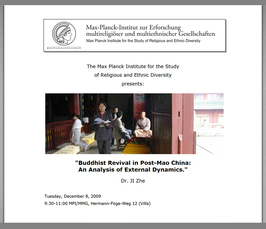"Buddhist Revival in Post-Mao China: An Analysis of External Dynamics"
- Date: Dec 8, 2009
- Time: 09:30 AM - 11:00 AM (Local Time Germany)
- Speaker: Ji Zhe (Nantes Institute for Advanced Studies, France)
- JI Zhe is a Post-doctoral Fellow at the Groupe Sociétés, Religions, Laïcités, and Resident Research Fellow in the Nantes Institute for Advanced Studies (2009-2010) in France. He received his PhD in sociology from the École des Hautes Études en Sciences Sociales (Paris) in 2007. He has published articles on Chinese Buddhism, Confucianism, youth religiosity and sociological theory of religion in various journals including Perspectives Chinoises, Social Compass, Cahiers internationaux de sociologie and Nova Religio. Based on his doctoral thesis, his book on modern changes in Chan Buddhism will be published by the Editions de l’EHESS (in the “En temps & lieux” series, 2010, Paris). He guest-edits a special issue of the French academic annual Extrême-Orient Extrême-Occident, which focuses on religion as educative space in modern and contemporary China (forthcoming in 2011). His current research is on Buddhism and Confucianism in the post-Mao era, and Chinese secularism.
- Location: MPI-MMG, Hermann-Föge-Weg 12, Göttingen
- Room: Conference Room

For more details please contact zhang(at)mmg.mpg.de.
The Buddhist revival in contemporary China includes not only the institutional reconstruction of the monastic tradition, but also the reflourishing of Buddhist symbols in different social spaces. This study will focus on this second aspect of the Buddhist revival, an issue rarely studied but is very significant for understanding the complex logic of the religious recomposition in post-Mao China. In fact, the circulation of Buddhist signs, symbols, and discourses in the society at large is not necessarily related to religious faith or practice as such. Yet, it constitutes a significant part of the “social influence” of Buddhism and a tangible aspect of its revitalization. In this process, the production, circulation and utilization of Buddhist symbols engaged not only the monastic authorities and other Buddhist communities, but also some social forces outside the Buddhist field, with their respective secular motivations. In the Chinese political context, it is precisely through the exchanges between the Buddhists and these non-religious social forces that Buddhism could be indirectly rehabilitated and legitimately expressed. In this presentation, I will examine three such social forces –– popular culture, Buddhist Studies, and the State –– and analyze how they contribute in their particular manner to the proliferation of Buddhist symbols in secular society, and at the same time, change the physiognomy of Buddhism in their dynamic interactions with monastic authorities.